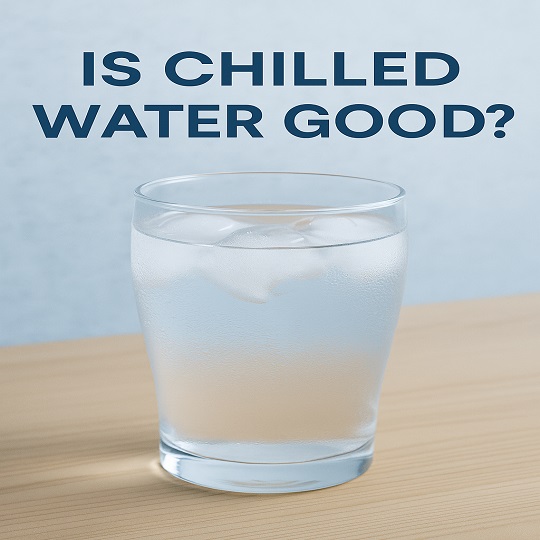
Is Chilled Water Good? Exploring the Health Benefits and Risks.When temperatures rise, there’s nothing quite as refreshing as a glass of ice-cold water. But have you ever wondered, is chilled water good for you? While it may seem like a simple question, the answer isn’t as straightforward as you might think. Chilled water has both benefits and drawbacks, depending on the context in which it’s consumed. In this article, we’ll explore the effects of cold water on your body, its potential health benefits, and when it might be better to opt for room temperature water instead.
The Basics: What Is Chilled Water?
Chilled water typically refers to water that is cooled below room temperature, often through refrigeration or the addition of ice. Most people consider water chilled when it falls between 1°C and 10°C (34°F to 50°F). It’s commonly consumed in warm climates or after physical exertion due to its refreshing nature.
The Benefits of Drinking Chilled Water
1. Hydration Boost
Cold water is often more palatable, especially during hot weather or after a workout. The refreshing sensation can encourage people to drink more, helping to prevent dehydration.
2. Temperature Regulation
After exercise, the body’s core temperature increases. Drinking chilled water can help bring your body temperature down more quickly, reducing the risk of heat-related conditions such as heat stroke or heat exhaustion.
3. May Improve Alertness
Cold water can act as a natural stimulant. When you’re feeling drowsy or sluggish, a glass of cold water can give you a quick burst of energy and mental clarity.
4. Calorie Burning
Some studies suggest that drinking cold water slightly increases your metabolic rate. The body uses energy to heat the cold water to core body temperature, potentially helping with weight management over time.
Potential Drawbacks of Cold Water
Despite its benefits, drinking chilled water isn’t ideal in every situation.
1. Digestive Discomfort
Cold water can constrict blood vessels and solidify fats from the foods you’ve eaten, potentially leading to slower digestion. Some people report bloating or cramps when consuming cold water with meals.
2. Exacerbates Certain Conditions
For individuals with conditions like migraines, sinus issues, or sore throats, cold water may worsen symptoms. It can trigger headaches or cause discomfort in sensitive teeth and throats.
3. Traditional Medicine Perspectives
In Traditional Chinese Medicine (TCM) and Ayurveda, cold water is thought to disrupt the balance of internal energies. These systems recommend drinking warm or room temperature water to support digestion and overall wellness.
When Is Cold Water Best?
Chilled water is most beneficial in the following scenarios:
- After exercise: Helps cool the body and rehydrates quickly.
- In hot weather: Prevents overheating and maintains hydration.
- To boost alertness: Offers a quick pick-me-up without caffeine.
When to Avoid Cold Water
There are certain times when it’s better to opt for warm or room temperature water:
- During meals: Warm water aids digestion more effectively.
- If you have a cold or flu: Warm liquids soothe the throat and loosen mucus.
- If you experience frequent bloating: Cold water might worsen gastrointestinal symptoms.
Cold vs. Warm Water: Which Is Better?
There’s no universal answer. The choice between cold and warm water should be based on your personal health needs and environmental conditions. Both have their unique advantages:
- Cold Water: Best for cooling the body, increasing alertness, and post-workout recovery.
- Warm Water: Better for digestion, detoxification, and those with chronic health issues like arthritis or sinus congestion.
Final Thoughts: Is Chilled Water Good for You?
Yes—chilled water can be good for you, especially in the right situations. It helps with hydration, cooling, and even boosting metabolism slightly. However, it’s not always the best option. If you’re dealing with digestion issues, respiratory illnesses, or just ate a heavy meal, room temperature or warm water may be more suitable.
Ultimately, staying hydrated—regardless of water temperature—is the most important factor. Listen to your body, consider the context, and choose what feels best for your individual needs.? Exploring the Health Benefits and Risks. When temperatures rise, there’s nothing quite as refreshing as a glass of ice-cold water. But have you ever wondered, is chilled water good for you? While it may seem like a simple question, the answer isn’t as straightforward as you might think. Chilled water has both benefits and drawbacks, depending on the context in which it’s consumed. In this article, we’ll explore the effects of cold water on your body, its potential health benefits, and when it might be better to opt for room temperature water instead.
The Basics: What Is Chilled Water?
Chilled water typically refers to water that is cooled below room temperature, often through refrigeration or the addition of ice. Most people consider water chilled when it falls between 1°C and 10°C (34°F to 50°F). It’s commonly consumed in warm climates or after physical exertion due to its refreshing nature.
The Benefits of Drinking Chilled Water
1. Hydration Boost
Cold water is often more palatable, especially during hot weather or after a workout. The refreshing sensation can encourage people to drink more, helping to prevent dehydration.
2. Temperature Regulation
After exercise, the body’s core temperature increases. Drinking chilled water can help bring your body temperature down more quickly, reducing the risk of heat-related conditions such as heat stroke or heat exhaustion.
3. May Improve Alertness
Cold water can act as a natural stimulant. When you’re feeling drowsy or sluggish, a glass of cold water can give you a quick burst of energy and mental clarity.
4. Calorie Burning
Some studies suggest that drinking cold water slightly increases your metabolic rate. The body uses energy to heat the cold water to core body temperature, potentially helping with weight management over time.
Potential Drawbacks of Cold Water
Despite its benefits, drinking chilled water isn’t ideal in every situation.
1. Digestive Discomfort
Cold water can constrict blood vessels and solidify fats from the foods you’ve eaten, potentially leading to slower digestion. Some people report bloating or cramps when consuming cold water with meals.
2. Exacerbates Certain Conditions
For individuals with conditions like migraines, sinus issues, or sore throats, cold water may worsen symptoms. It can trigger headaches or cause discomfort in sensitive teeth and throats.
3. Traditional Medicine Perspectives
In Traditional Chinese Medicine (TCM) and Ayurveda, cold water is thought to disrupt the balance of internal energies. These systems recommend drinking warm or room temperature water to support digestion and overall wellness.
When Is Cold Water Best?
Chilled water is most beneficial in the following scenarios:
- After exercise: Helps cool the body and rehydrates quickly.
- In hot weather: Prevents overheating and maintains hydration.
- To boost alertness: Offers a quick pick-me-up without caffeine.
When to Avoid Cold Water
There are certain times when it’s better to opt for warm or room temperature water:
- During meals: Warm water aids digestion more effectively.
- If you have a cold or flu: Warm liquids soothe the throat and loosen mucus.
- If you experience frequent bloating: Cold water might worsen gastrointestinal symptoms.
Cold vs. Warm Water: Which Is Better?
There’s no universal answer. The choice between cold and warm water should be based on your personal health needs and environmental conditions. Both have their unique advantages:
- Cold Water: Best for cooling the body, increasing alertness, and post-workout recovery.
- Warm Water: Better for digestion, detoxification, and those with chronic health issues like arthritis or sinus congestion.
Final Thoughts: Is Chilled Water Good for You?
Yes—chilled water can be good for you, especially in the right situations. It helps with hydration, cooling, and even boosting metabolism slightly. However, it’s not always the best option. If you’re dealing with digestion issues, respiratory illnesses, or just ate a heavy meal, room temperature or warm water may be more suitable.
Ultimately, staying hydrated—regardless of water temperature—is the most important factor. Listen to your body, consider the context, and choose what feels best for your individual needs.
References
- Popkin, B. M., D’Anci, K. E., & Rosenberg, I. H. (2010). Water, hydration, and health. Nutrition Reviews, 68(8), 439–458. https://doi.org/10.1111/j.1753-4887.2010.00304.x
- Maughan, R. J., & Shirreffs, S. M. (2010). Dehydration and rehydration in competitive sport. Scandinavian Journal of Medicine & Science in Sports, 20, 40–47. https://doi.org/10.1111/j.1600-0838.2010.01207.x
- Murray, B. (2007). Hydration and physical performance. Journal of the American College of Nutrition, 26(5 Suppl), 542S–548S. https://doi.org/10.1080/07315724.2007.10719656
- Sun, Y., et al. (2013). Drinking cold water increases metabolic rate in humans. Journal of Clinical Endocrinology & Metabolism, 88(2), 601–606. https://doi.org/10.1210/jc.2002-021138
- Tulp, O. L., & Fricke, R. (2011). The effect of water temperature on postprandial metabolism and thermogenesis. Journal of Medicinal Food, 14(12), 1496–1500. https://doi.org/10.1089/jmf.2010.0280
- Traditional Chinese Medicine World Foundation. (n.d.). Why warm water? The ancient wellness secret. Retrieved from https://www.tcmworld.org/why-warm-water-the-ancient-wellness-secret/
- National Institute on Aging. (2021). Tips for staying hydrated. U.S. Department of Health & Human Services. Retrieved from https://www.nia.nih.gov/health/tips-drinking-more-water
- Ayurveda Journal of Health. (2020). The Ayurvedic perspective on water temperature. Retrieved from https://www.ayurvedajournal.org
- WebMD. (2022). Is cold water bad for digestion? Retrieved from https://www.webmd.com/digestive-disorders/ss/slideshow-digestion
- Harvard T.H. Chan School of Public Health. (n.d.). The importance of hydration. Retrieved from https://www.hsph.harvard.edu/nutritionsource/water/




